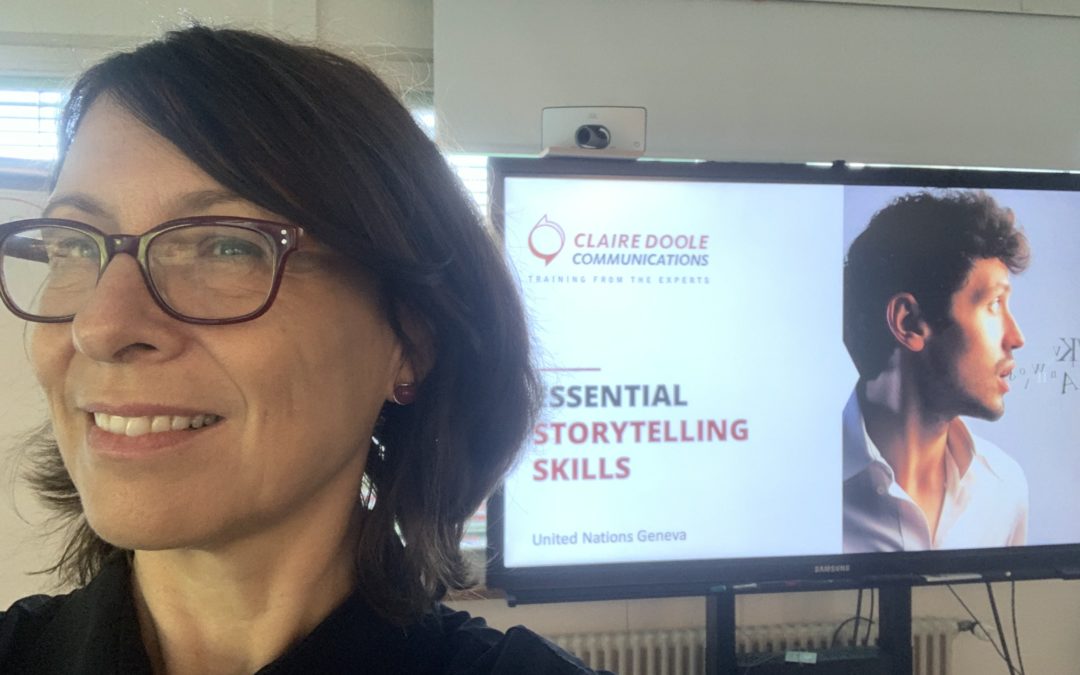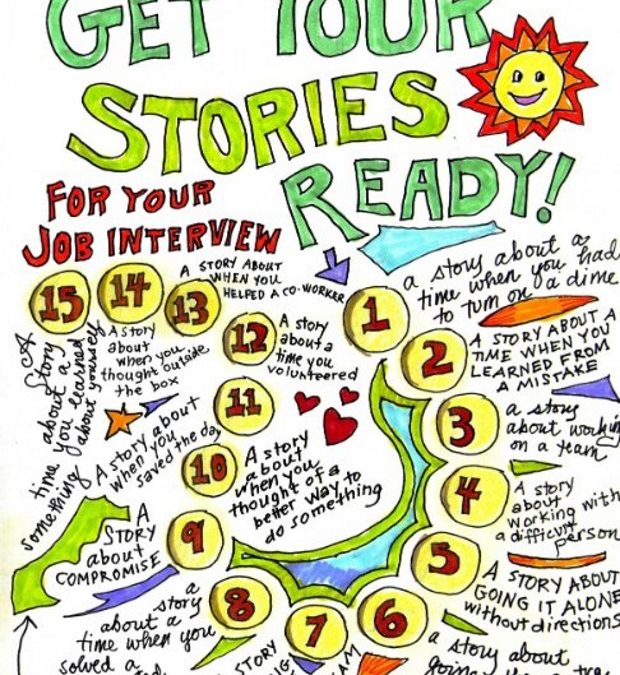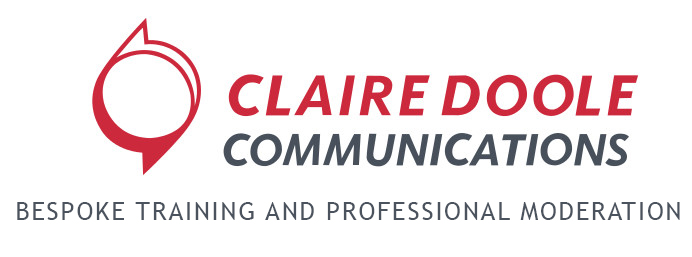
by Claire Doole | Nov 28, 2021 | Blog, Storytelling
Everyone loves a good story. Our parents read us stories, and we tell them naturally to friends and family. So why is it that in a professional context, we are so reluctant to tell stories?
I ask this question at the start of my storytelling workshops. Participants come up with a number of answers ranging from it is culturally inappropriate, too personal or a lack of ability.
Often people tell me storytelling is too Anglo-Saxon and not appropriate in Mediterranean or other cultures. In fact, I would argue that Africans are fantastic storytellers due to their oral traditions. But I think this reluctance is because people associate storytelling with the high drama of Hollywood with its rollercoaster of emotions.
In fact, storytelling is much simpler; it is about adding colour to the facts.
Ethos, pathos, logos
The Greeks got it right 2,500 years ago. Aristotle said if you want to persuade someone of something, you need to appeal to ethos (credibility), logos (logic) and pathos (stirring emotion in the audience). In the workplace we often have ethos and logos, but shy away from pathos.
Pathos though comes in many different forms. It can come from a personal story, sharing an anecdote or case study, dramatisation, a quotation or using a rhetorical device such as a metaphor or analogy.
We are all storytellers
We have all experienced significant moments in our lives – a first job, a lasting love affair, a major professional or personal challenge. Each of these moments has the potential to be turned into a story that we can tell in a professional context. The only difference from telling it to a friend, is that there must be a point to it. If you are telling a story in a presentation/speech, in a job interview or while mentoring or evaluating a team member, you need to ensure that it illustrates your idea or message.
The personal story is the most powerful and easiest to relate as we have lived through it, but telling other people’s stories (anecdotes) can also be memorable.
Show the challenges you seek to overcome
Often organisations and companies I work with underplay the challenges they face. I once made a film for a client about reuniting children separated from their families in Democratic Republice of Congo.
Many had been abducted by armed groups and fled to South Sudan. The spokesperson made it sound like a pure logistics operation – organising flights back home for the children. Until, at the last moment a girl, accompanied by the woman she was working for, refused to get into the car to the airport. The spokesperson negotiated a highly fraught situation, and then explained to me that often children don’t want to return to their families due to fear of the armed groups still in the bush or because they had found jobs or friends in the towns they had fled to.
He said often there was no conventional happy ending as sometimes the children would leave their families again and make their way back to the town. For me, it was the complexity of the situation that made the story so much more compelling and the work of this client so much more impressive!!
Yes, you can!
To paraphrase a well-known President Obama election speech slogan, everyone can learn how to structure and tell a memorable story.
In my virtual and face-to-face workshops, we go through the various techniques by telling each other stories that can be used in different professional contexts. By the end, everyone has experienced that rush of hormones that comes when we listen to a good story and has the confidence to add storytelling to their communication’s toolbox.
Have a look at a short extract from a virtual workshop:

by Claire Doole | Feb 23, 2020 | Blog, Storytelling
“I am not really comfortable with storytelling. I don’t see how I can use it in my work”. This is a typical response from senior managers/executives to the idea of attending a storytelling workshop. And what’s more, I understand where they are coming from. As a BBC journalist, I was a professional storyteller – every day looking for the nugget of gold that I could mine to tell a story about something that had changed in the world.
But telling other people’s stories was much easier than telling my own. Journalists don’t like being the centre of the story – it makes them, among other things, feel vulnerable. What I have learned as a trainer, moderator and coach is that storytelling is about sharing experiences – either your own or someone else’s – so that you connect and build rapport, trust and credibility with those around you.
Research shows that our brains are hardwired to listen and to tell stories. Stories are how we think, make meaning of life and explain how things work. They help us make decisions, persuade others, create identities and teach social values.
In a business or organisational setting storytelling helps to sell, educate, inspire and motivate. It is a strategic tool that can bring you closer to your colleagues, clients and peers and transform how you and your organisation are perceived.
How to tell stories
All of the above holds true if the story is well told. It needs to have a clear structure so that it is easy to follow and relevant to the audience. In everyday life, we tell stories to our friends without necessarily drawing a morale or lesson learnt. If you are telling a story in a professional context you must always have a point.
In my workshops, I often tell a personal story about how I lost the equivalent of my annual salary when I first joined the BBC, due to poor advice by a former financial advisor in Geneva. He put me in funds that were far too risky for my investment profile, and which either collapsed or were suspended by the regulator. I explain how I then tried (and am still trying!) to expose his wrongdoing. I tell this story showing that there are different structures that you can use to achieve different impacts, as well as different rhetorical techniques to make it memorable.
It is a story that shows who I am – illustrating my values – trust, perseverance and quest for justice. It is a story that I could use to show people the type of person I am and why they should believe in me or want to work with me.
But it is also a story that can be used to teach a lesson – underlining the importance of assuming responsibility for your finances. I could also tell this story to motivate change by shedding light on what is wrong about the present way Swiss independent financial advisors are regulated and the need for tougher regulation.
Everyone is a storyteller
I hope that none of you have to tell a story like this, but if you are looking for a story, one of the simplest ways is to think about a key moment in your life – positive or negative – and reflect on the lesson learnt.
I also advise people to start to build a library of stories. Think about:
• Moments that made you who you are or who clarified your values
• Moments when you discovered your voice or leadership potential
• Difficult moments in business but worthwhile struggles or extraordinary feats
• Dangerous mistakes in business
• Stories of how your company handled the past
• Stories of how the future could look bright or dark
Start to catalogue stories that might serve as powerful illustrations of your ideas, register other peoples or institutional stories (anecdotes) that could illustrate a point you want to make or think about universal myths and fables that you can use as metaphors and analogies.
We are all storytellers but we are not always aware of it. Have the courage to tell a story and you will see that it can be your most valuable asset and even give you competitive advantage.
PS If you would like to know more about the story of my financial advisor, please email me. My purpose is naturally to warn you against using him!
PPS If you are interested in learning how to become a master storyteller, I run two courses – on public speaking and on storytelling in business.
Please get in touch by email or book a 30-minute discovery call.

by Claire Doole | May 30, 2019 | Blog, Storytelling
In presentation training, we focus on storytelling as a way of building emotional connection with the audience. Stories win hearts and minds, inspire and motivate and engage and entertain.
In a job interview, stories can be extremely effective. They will help you stand out in the interviewer’s mind and highlight your key competencies.
Often, you will make a series of assertions such as I can help you increase sales, attract more funding or influence legislation. However, you will need to provide evidence for the interviewer to take you seriously. This is where stories, which are based on real-life examples, can help you come across as genuine and credible.
In my job interview coaching, we examine some typical questions, like the ones below, and apply storytelling techniques.
• Tell us about yourself.
• Why do you want to work for us?
• Why do you think you are the right person for this job?
• Tell us about a time you have succeeded/ failed.
• How do you deal with conflicts at work?
• Tell us what you don’t like about your current working day?
• What sort of things do you and your boss disagree about?
• What is your greatest strength and how will it help you in this job?
• What do you see as the most challenging part of this position?
As you can see, the interviewer is looking to assess your motivation, determination and spirit of collaboration. These are abstract concepts, and unfortunately the human brain is particularly bad at remembering the abstract. So you need to back them up with concrete examples or stories.
The 5 elements of a powerful story
In order to make an impact, your story needs the following elements:
1. Clear structure. You need to set out the context – explain who was involved, when, and where. There has to be some action – something has to change and then comes the resolution. In a presentation, the story serves to reinforce a key message. In a job interview, it can spotlight the actions you took to resolve a problem or challenge and the results that followed. If you can add a key learning such as – this taught me that you have to persevere and not give up – this will reinforce the impression that you are someone who reflects and learns from the past.
2. Human interest. If you are telling a story about a project or programme explain how you felt during the process. How did you feel when faced with a challenge? How did you feel when the situation was resolved either positively or negatively? And how did the people involved in the project feel – were they overjoyed, inspired or relieved?
3. Credibility. Your story must be true and based on fact. It will also be much easier to relate and remember if it is your story.
4. Topicality. If you are using a case study as one of your examples, it should still be valid and not have been overtaken by events.
5. Relevance. It helps if your story is relevant to the audience either geographically or close to the sector they are working in. For example, if you are applying for a job with a food company, but come from an environmental background, you might want to talk about an initiative you led on sustainability as this could be relevant to their policies on food waste, recycling or naturally sourced food.
And one last thought, be ready to answer some of those personality questions with stories from your non-work life. Some interviewers, for examples, like to questions such as – tell us about your childhood /what do you do outside work/tell us what makes you smile. All of these are great questions for a short personal story.
In my next blog I shall look at how to deliver that powerful story during an interview.



